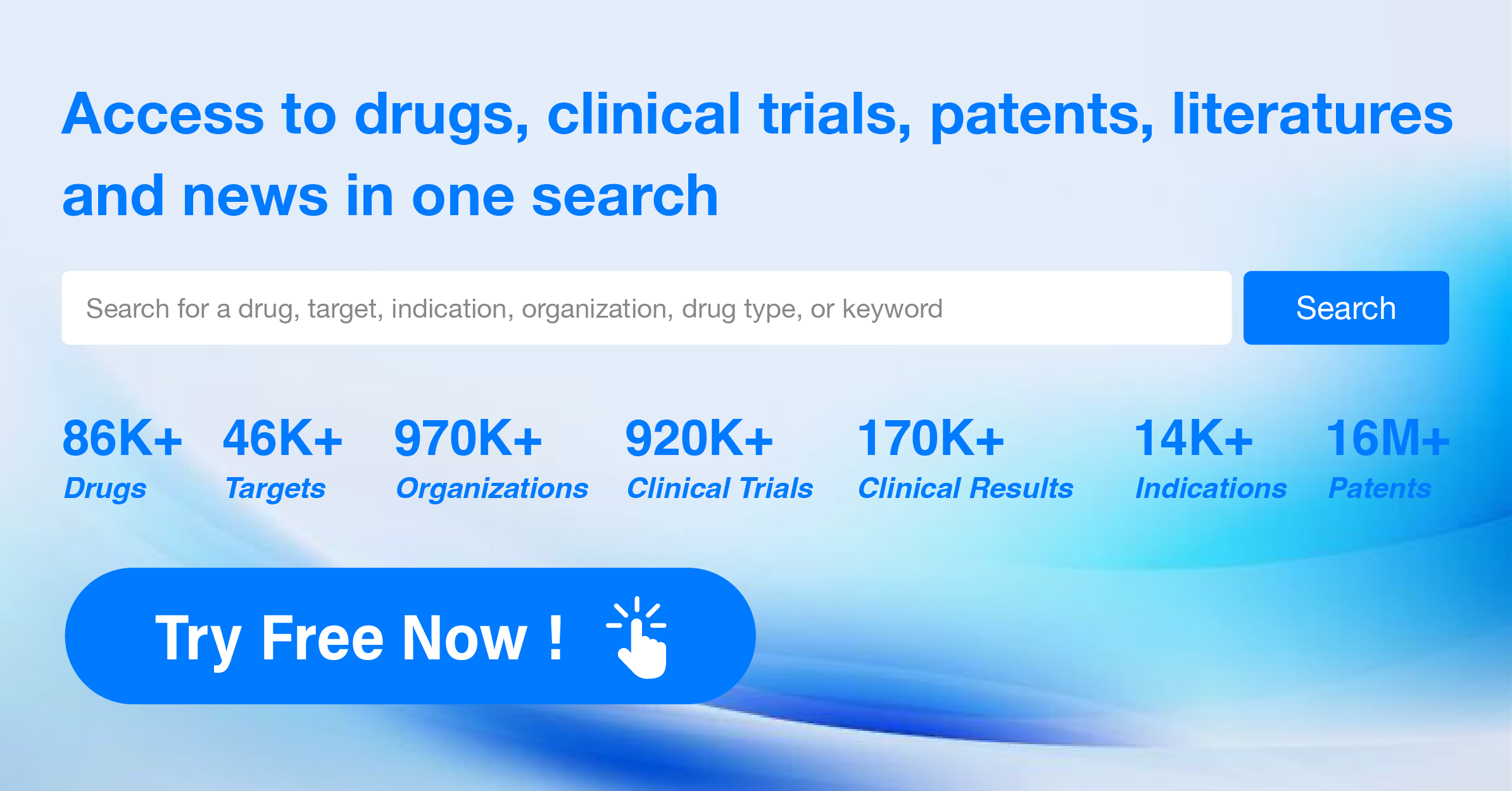Pharma Frontiers: Daily Digest of Global Pharmaceutical News - May 16
1.Zai Lab's subcutaneous injection of Efgartigimod for a new indication has been accepted for review.
On May 15, Zai Lab announced that the Center for Drug Evaluation (CDE) of the National Medical Products Administration (NMPA) in China has accepted the supplemental Biologics License Application (sBLA) for subcutaneous injection of Efgartigimod for the treatment of Chronic Inflammatory Demyelinating Polyneuropathy (CIDP). This application has been granted priority review status as of May 11, 2024. It is estimated that approximately 50,000 patients in China suffer from CIDP. Current treatment options primarily include corticosteroids and intravenous immunoglobulin (IVIg), with plasma exchange (PLEX) being a potential alternative. However, access to PLEX or IVIg is limited in many regions worldwide, including China. Given that the majority of patients require prolonged treatment periods, there remains a significant unmet need for effective, well-tolerated, and convenient alternative therapies for CIDP patients in China.
This sBLA submission is based on findings from the ADHERE (NCT04281472) study, a multi-center, randomized, double-blind, placebo-controlled trial aimed at evaluating the efficacy of subcutaneous Efgartigimod in treating CIDP. Zai Lab enrolled patients from the Greater China region in the ADHERE study, whose treatment responses were consistent with the global results. Subgroup analysis of Chinese patients demonstrated a 69% reduction in relapse rates compared to placebo. Furthermore, among Chinese patients treated in the open-label extension phase of the study, 78% showed evidence of clinical improvement, further underscoring the role of IgG autoantibodies in the pathophysiology of CIDP.
Throughout the study, weekly subcutaneous administration of Efgartigimod (for up to one year) in the Chinese patient cohort displayed a favorable safety and tolerability profile, aligning with results observed in the global study population.
2.Gene Therapy Upstaza for Direct Brain Injection Granted FDA Priority Review Status, Effective for Five Years After a Single Treatment
On May 15, PTC Therapeutics announced that the U.S. FDA has accepted its Biologics License Application (BLA) for Upstaza (eladocagene exuparvovec) and granted it Priority Review status for the treatment of Aromatic L-Amino Acid Decarboxylase (AADC) deficiency. The FDA is expected to complete its review by November 13 of this year. Upstaza is an adeno-associated virus type 2 (AAV2)-based gene therapy that carries a functional human DDC gene. It is designed to deliver the functional DDC gene directly to the putamen in the brain through a single administration, with the aim of increasing AADC enzyme levels and restoring dopamine production.
The efficacy and safety profile of Upstaza has been validated in multiple clinical trials and compassionate use programs, with the first patient treated in 2010. In these clinical studies, patients who failed to achieve expected motor developmental milestones showed clinically meaningful improvements in motor functions as early as three months following treatment, with benefits persisting for over five years. Additionally, all treated patients exhibited cognitive improvements. Clinical trial results have been published in the journal Molecular Therapy, which is associated with Cell. In 2022, it received its first approval from the European Commission, becoming the first gene therapy approved for direct brain injection and the first approved therapy to alter the disease course of AADC deficiency.
AADC deficiency is a fatal, rare genetic disorder that typically leads to severe disability and damage within the first few months of a patient’s life, affecting multiple aspects of their daily living. It is caused by mutations in the DDC gene, which encodes the AADC enzyme, leading to a loss of AADC enzyme function.
3.Immatics to Initiate Phase 2/3 Trial of Innovative Cell Therapy
On May 15, during its Q1 2024 financial report, Immatics unveiled the latest data on IMA203, a T-cell receptor T-cell (TCR-T) therapy under investigation for the treatment of pre-treated metastatic melanoma patients. The analysis showed that 87% of patients experienced tumor reduction, with a confirmed objective response rate (cORR) of 55%. Immatics plans to provide the next clinical data update for IMA203 at a medical conference in the second half of 2024. Additionally, the company aims to initiate a registrational Phase 2/3 clinical trial of IMA203 as a second-line or higher therapy for melanoma patients, pending further discussions with the U.S. FDA later this year.
The Phase 1 trial data, disclosed from 30 evaluable metastatic melanoma patients as of April 25, 2024, showed that the main results from monotherapy with IMA203 were: a confirmed objective response rate of 55% (16/29), a disease control rate of 90% (27/30), and 87% of patients (26/30) experienced tumor reduction. The median duration of response (mDOR) was 13.5 months (ranging from a minimum of 1.2+ months to a maximum of 21.5+ months), including 11 out of 16 confirmed objective responders showing ongoing responses at the data cutoff. The confirmed response rates were similar across various melanoma subtypes: 56% (9/16) for cutaneous melanoma and 54% (7/13) for other melanoma subtypes.
IMA203, developed using Immatics' proprietary ACTengine platform, is a TCR-T cell therapy targeting the PRAME melanoma antigen presented by HLA-A*02. PRAME is a protein frequently expressed in a variety of solid tumors, indicating that IMA203 has the potential to treat a broad cancer patient population. ACTengine is a personalized cell therapy platform designed for patients with advanced solid tumors.
4.Eisai/Biogen Submit Lecanemab for Alzheimer's Disease for Market Approval
On May 14, Eisai and Biogen announced that Eisai has begun submitting a rolling Biologics License Application (BLA) to the U.S. FDA for subcutaneous lecanemab, intended for the treatment of early Alzheimer's disease (for patients with mild cognitive impairment or mild dementia). This product had previously been granted Fast Track designation by the FDA, and is designed for patients who have completed the bi-weekly intravenous initiation phase to subsequently receive weekly subcutaneous injections to maintain effective drug concentrations. If approved by the FDA, this product could potentially be administered at home and require less time for injection compared to intravenous administration.
Lecanemab is a humanized monoclonal antibody against soluble β-amyloid (Aβ). It binds selectively to soluble Aβ aggregates (protofibrils) as well as insoluble Aβ aggregates (fibrils), the main components of Aβ plaques, thereby clearing Aβ protofibrils and Aβ plaques from the brain. Eisai leads the global development and regulatory submission of lecanemab, while both Eisai and Biogen will jointly commercialize and promote the product. In January 2024, this product was approved in China for the treatment of early Alzheimer's disease. The reduction of protofibrils may help to prevent the progression of Alzheimer's disease by reducing neuronal damage and cognitive impairment, thus ongoing treatments could prolong the therapeutic effect.
It is reported that the lecanemab submitted for market approval this time is a weekly subcutaneous injection product, used to maintain effective drug concentrations for patients who have completed the bi-weekly intravenous initiation phase, thereby sustaining the clearance of highly toxic protofibrils. Compared to intravenous administration, subcutaneous injection could reduce the burden of hospital visits and care for patients.
5.Takeda Initiates Phase 3 Clinical Trials of TYK2 Inhibitor for Psoriasis in China, Aiming to Enroll 1,600 Participants Globally
Recently, the Chinese Clinical Trial Registry and Information Disclosure Platform announced that Takeda has initiated two international multi-center Phase 3 clinical trials (including sites in China) for TAK-279 tablets, targeting the indication of moderate to severe plaque psoriasis. Publicly available information indicates that TAK-279 is a highly selective, oral allosteric tyrosine kinase 2 (TYK2) inhibitor. In December 2022, Takeda acquired Nimbus Lakshmi and its developed TYK2 inhibitor for an upfront payment of $4 billion and commercial milestone payments of up to $2 billion.
Takeda has commenced two Phase 3 clinical trials in China, both aimed at evaluating the safety and efficacy of TAK-279 30 mg once daily oral administration for the treatment of moderate to severe plaque psoriasis. One of the studies has a treatment duration of 52 weeks, while the other includes a randomized withdrawal and retreatment phase with a treatment duration of 60 weeks. According to information retrieved from ClinicalTrials.gov, these two international Phase 3 trials were initiated in November 2023, with a global target enrolment of 1,600 participants.
The initiation of these international Phase 3 trials marks a significant milestone in the global development of this TYK2 inhibitor, bringing the investigational new drug one step closer to benefiting patients. Takeda had previously announced positive results from a Phase 2b clinical trial of TAK-279 tablets for the treatment of moderate to severe plaque psoriasis in March 2023. At 12 weeks, a higher proportion of patients in the 30 mg TAK-279 group achieved a 75% improvement from baseline in the Psoriasis Area and Severity Index (PASI 75) compared to the placebo group (67% vs. 6%), meeting the primary endpoint of the study. Additionally, higher proportions of patients in the 30 mg group achieved PASI 90 and PASI 100 (46% and 33%, respectively, compared to 0% in the placebo group). PASI 90 or PASI 100 represent nearly complete and complete skin clearance, respectively.
6.Mabwell Bioscience’s ADC Product Receives Another FDA Fast Track Designation
On May 14, Mabwell Bioscience announced that its independently developed antibody-drug conjugate (ADC) targeting Nectin-4, designated as 9MW2821, has been granted Fast Track Designation by the U.S. Food and Drug Administration (FDA) for the treatment of recurrent or metastatic cervical cancer in patients who have failed prior platinum-containing chemotherapy. This product had already acquired FDA Fast Track Designation and Orphan Drug Designation for the treatment of advanced, recurrent, or metastatic esophageal squamous cell carcinoma and esophageal cancer, respectively. According to recent clinical research data on cervical cancer released by Mabwell Bioscience, the Disease Control Rate (DCR) for patients reached 89.19%, with a DCR of 92.31% among patients with Nectin-4 expression levels of 3+.
9MW2821 is an antibody-directed conjugate drug developed by Mabwell Bioscience, consisting of an innovative antibody molecule, a novel linker, and a novel payload (TOP1 inhibitor). Employing conjugation techniques and optimized ADC conjugation processes, the product achieves targeted modification of the antibody. Once injected into the body, 9MW2821 binds to antigens on the surface of tumor cells and enters the cells, where it releases small molecules through specific enzymatic action, thereby achieving precise tumor cell killing.
In March this year, Mabwell Bioscience announced that it presented clinical research data on 9MW282 in the treatment of cervical cancer at the annual meeting of the Society of Gynecologic Oncology (SGO) in the form of an oral presentation. This multi-center, open-label Phase 1/2 clinical study included patients with recurrent or metastatic Nectin-4 positive cervical cancer who had failed no more than two lines of systemic therapy and experienced progression following platinum-based chemotherapy, with or without bevacizumab.
7.Novo Nordisk's Latest Clinical Trial on Semaglutide for Liver Disease Set to Begin
Recently, according to ClinicalTrials.gov, Novo Nordisk is set to initiate a Phase 2 trial to investigate the effects of three drugs, including semaglutide, on liver function, liver fibrosis, and alcohol consumption in patients with alcohol-related liver disease. According to industry media outlet STAT, this could be the company's first examination of the impact of glucagon-like peptide-1 (GLP-1) drugs on addiction. The upcoming trial will be a randomized, blinded, parallel-group, Phase 2 study expected to enroll 240 adult patients with alcohol-related liver disease. These patients self-report a history of alcohol consumption for five years or more, and an average daily alcohol intake of 50 grams or more (for men) / 40 grams or more (for women) in the past year prior to signing the consent form. Additionally, these patients have an enhanced liver fibrosis (ELF) score of 9.8 units or higher.
The drugs to be tested in the trial include semaglutide, CagriSema, and NNC0194-0499. CagriSema is a fixed-dose combination of semaglutide and the long-acting amylin analogue cagrilintide, currently under development by Novo Nordisk. NNC0194-0499 is an investigational new drug targeting FGF-21, a hormone produced by the liver that plays a role in inflammation. This 39-week study will examine the effects of these drugs, alone or in combination, compared to a placebo, in patients with alcohol-related liver disease. The study will measure changes in liver scarring or fibrosis as well as alterations in alcohol intake among the patients.
This trial could be significant in revealing how GLP-1 drugs modify addiction symptoms. Initially discovered to be active in the gut, many studies have demonstrated that GLP-1 drugs, which are more potent than the natural hormone, can effectively enter the brain and alter the neural circuits that drive cravings.
8.Over $2 Billion! AbbVie and Gilgamesh Collaborate to Develop Next-Generation Mental Health Therapies
On May 13, AbbVie and Gilgamesh Pharmaceuticals announced a collaboration and option agreement to develop next-generation therapies for mental health disorders. This collaboration will leverage AbbVie’s expertise in psychiatry and Gilgamesh’s innovative research platform to discover new neuroblasts. Under the terms of the agreement, AbbVie and Gilgamesh have committed to research and develop a portfolio of next-generation treatments for mental disorders. Upon exercising the option, AbbVie will lead the development and commercialization activities. Gilgamesh will receive an upfront payment of $65 million from AbbVie and is eligible for up to $1.95 billion in option fees and milestones, as well as tiered royalties ranging from mid-single digits to low double digits based on net sales.
Classic psychedelic compounds offer new mechanisms for addressing mental health disorders, with some demonstrating good clinical efficacy where other treatments have failed. However, these first-generation compounds can cause profound psychoactive effects, such as hallucinations, necessitating office-based management and accompanying supportive care. Next-generation targeted mechanisms, referred to as neuroblasts, have shown potential to provide significant clinical benefits while aiming to minimize the challenging effects of first-generation compounds. These new compounds hold great promise for treating a variety of mental disorders, including mood and anxiety disorders. Gilgamesh has successfully identified leading compounds within this new class of therapies using an innovative research platform.




